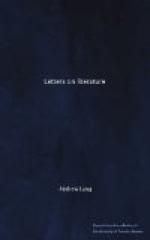But Aucassin learns at least that Nicolette is in the wood, and he rides at adventure after her, till the thorns have ruined his silken surcoat, and the blood, dripping from his torn body, makes a visible track in the grass. So, as he wept, he met a monstrous man of the wood, that asked him why he lamented. And he said he was sorrowing for a lily-white hound that he had lost. Then the wild man mocked him, and told his own tale. He was in that estate which Achilles, among the ghosts, preferred to all the kingship of the dead outworn. He was hind and hireling to a villein, and he had lost one of the villein’s oxen. For that he dared not go into the town, where a prison awaited him. Moreover, they had dragged the very bed from under his old mother, to pay the price of the ox, and she lay on straw; and at that the woodman wept.
A curious touch, is it not, of pity for the people? The old poet is serious for one moment. “Compare,” he says, “the sorrows of sentiment, of ladies and lovers, praised in song, with the sorrows of the poor, with troubles that are real and not of the heart!” Even Aucassin the lovelorn feels it, and gives the hind money to pay for his ox, and so riding on comes to a lodge that Nicolette has built with blossoms and boughs. And Aucassin crept in and looked through a gap in the fragrant walls of the lodge, and saw the stars in heaven, and one that was brighter than the rest.
Does one not feel it, the cool of that old summer night, the sweet smell of broken boughs and trodden grass and deep dew, and the shining of the star?
“Star that I from far behold
That the moon draws to her fold,
Nicolette with thee doth dwell,
My sweet love with locks of gold,”
sings Aucassin. “And when Nicolette heard Aucassin, right so came she unto him, and passed within the lodge, and cast her arms about his neck and kissed and embraced him:
“Fair sweet friend, welcome
be thou!”
“And thou, fair sweet love,
be thou welcome!”
There the story should end, in a dream of a summer’s night. But the old minstrel did not end it so, or some one has continued his work with a heavier hand. Aucassin rides, he cares not whither, if he has but his love with him. And they come to a fantastic land of burlesque, such as Pantagruel’s crew touched at many a time. And Nicolette is taken by Carthaginian pirates, and proves to be daughter to the King of Carthage, and leaves his court and comes to Beaucaire in the disguise of a ministrel, and “journeys end in lovers’ meeting.”
That is all the tale, with its gaps, its careless passages, its adventures that do not interest the poet. He only cares for youth, love, spring, flowers, and the song of the birds; the rest, except the passage about the hind, is mere “business” done casually, because the audience expects broad jests, hard blows, misadventures, recognitions. What lives is the touch of poetry, of longing, of tender heart, of humorous resignation. It lives, and always must live, “while the nature of man is the same.” The poet hopes his tale will gladden sad men. This service it did for M. Bida, he says, in the dreadful year of 1870-71, when he translated “Aucassin.” This, too, it has done for me in days not delightful. {6}




